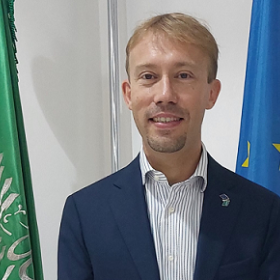

Michele Lombardini - Head of Administration at the EU Delegation to Saudi Arabia
What is the role of a HoA in an EU Delegation?
The job of HoA encompasses several areas ranging from budget, human resources, finance, and security to consular affairs. It requires a high level of responsibility and flexibility.
The role of the HoA is primarily to assist the HoD in the management and functioning of the Delegation
What is the most satisfying part of your job?
HoA has to have a service-oriented approach and the biggest satisfaction is to help the colleagues while, at the same time, ensuring compliance with the applicable administrative and financial rules.
Why should people apply to work for the EU and in particular for the job of Head of Administration in an EU Delegation ?
The job of HoA could be very rewarding but also very challenging. People should apply for it if they look for a post that implies a high level of responsibility and independence, where they are called to take decision almost on a daily basis.
How do you see the frequent rotation and opportunities for professional growth in EU Delegations/in the EEAS?
Rotation to different countries is a core of any diplomatic service. I see rotation among EU Delegations as a big opportunity to learn and to develop new professional and personal skills.
What are the advantages of working in a diverse environment like the one of EU Delegations?
The most significant advantage is to meet and work with people with different educational, linguistic and historic background. This creates a multicultural environment that is the peculiarity of the work in the EU Delegations.
What do you find difficult in turn?
What I find most difficult sometime is the management of people and of their diverse demands.
What is it like to be posted in EU Delegations ?
Working in EU Delegation is a very interesting and challenging experience and a rewarding job opportunity.
Living in non-EU country is also very stimulating. It gives the occasion to meet new people, explore new places and learn new things.
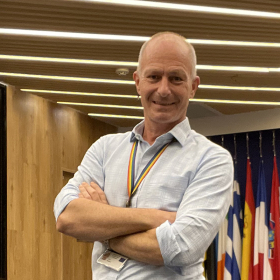
Johan S. - Head of Administration at the EU Delegation to Myanmar
What is your background and what did you do before becoming a Head of Administration?
I worked at DG INTPA in Finance & Contracts at Headquarters and in the Delegation to the Philippines. My first posting as Head of Administration was at the Delegation to Indonesia and Brunei and ASEAN and now I have been Head of Administration to Myanmar since 2016. In between I worked 2 years at the Inspection and ex-post Division in Headquarters.
In a nutshell, how would you describe the role of Head of Administration in an EU Delegation?
In a nutshell, the Head of Administration has to make sure that everything is in place so that the other colleagues can do their job.
That includes infrastructure (accommodation for expat staff, offices), security, office cars, accounting (payments of all administrative costs of the Delegation and work related expenses of the staff, management of the Delegation’s local bank accounts), tendering of contracts for the above mentioned activities and management of the contracts, human resources of the local agents (recruitment, evaluation, promotion, medical reimbursements), training coordinator, protocol (obtaining visas, diplomatic ID, driver’s licences for all expatriate staff and their family members, import/export authorisations, tax exemptions, consular correspondent, etc) and IT. And when things go wrong in the country, you have to be efficient in crisis management.
What is the most satisfying part of your job?
The job is so diverse, you never get bored one single moment. And it is very satisfactory to see concrete results of your work.
Why should people apply to work for the EU and in particular for the job of Head of Administration in an EU Delegation?
If you are a person who likes diversity, who believes in the European project and who wants to make a difference, working for the EU is for you!
The job of Head of Administration is without any doubt the most interesting (and challenging) job available for AST officials or Contract Agents. Apart from the Head of Delegation, the Head of Administration has the most responsibilities in a Delegation and you really make a difference in the daily life of your colleagues. The diversity of tasks you are responsible for keep you alert and you learn every day – not only procedures and technical knowledge but also in social skills and about the culture of the country you are posted in.
To feel good as Head of Administration, you must be willing to work a lot and take on responsibilities, have excellent people skills, be a problem solver, be stress resistant and be a positive person.
How do you handle /how do you see the frequent rotation and opportunities for professional growth in EU Delegations / in the EEAS?
Even if you apply for the same job, every country you are posted in brings its own specificities and uniqueness into your daily work. You adapt, learn and grow as a professional and as a person. The EEAS allows you to shorten your posting if the country is not your cup of tea, or extend if you really like it. Through your daily interaction with your colleagues of other sections, you also learn about their job and the EEAS allows you to apply for other types of posts if that is what you want.
What are the advantages of working in a diverse environment like the one of EU Delegations?
We were all raised within our own community with its culture, values and habits. Working in an EU Delegation exposes you to a multitude of cultures, habits and values. Not only from the country you are posted in, but also from your other expatriate colleagues (and friends) who come from all over Europe (the world). These exposures enrich your life, broaden your mind and make you a better person.
What do you find difficult in turn?
Living far away from friends and family is sometime difficult, but the EEAS foresees in annual home leave and rest leaves (in hardship countries) so that you can go back regularly to Europe.
What is it like to work and live in EU Delegations?
First of all, it is important to prepare yourself before you apply for a certain country. Doing a bit of research on life in a country can save you from bad surprises or disappointments. And still then, you will be in for plenty of surprises, which makes it so interesting to work and live in a different country. And while you immerse yourself as much as you want in your new country, inside the Delegation, you will be in an environment that is familiar, a little piece of Europe.
In a Delegation you will be part of a small community with its advantages and disadvantages. It is therefore important to have a positive mindset and maintain good relationships with your colleagues. Overall, I’ve only had good experiences, learned so much, did things I never thought I would be able to do and made friends for life. Of course there are difficult moments, situations or colleagues but that you have everywhere and the advantages of being able to live and work abroad largely compensate for the less pleasant instances you may experience.
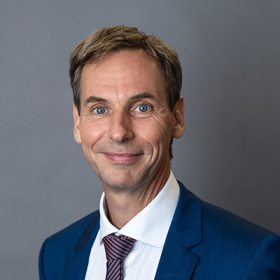
Walter van H., Head of the trade and economic section
Following my studies in political economy, development and business administration, I worked on trade, industry and development policies, among others for the International Labour Organisation in Nigeria; the Dutch Foreign Service; Oxfam Novib; and more recently the European Union.
For the EU, I helped establish a joint undertaking in Barcelona supporting nuclear fusion development. I worked on humanitarian aid and health policies and more recently on our trade policy, leveraging EU trade for improving labour, human rights and environmental standards.
I was posted in Thailand, Indonesia and the Philippines, where I served as head of the trade section of the EU Delegation, engaging government and civil society on free trade agreements, trade and sustainability and market access.
In January 2021, I was appointed head of the trade and economic section of the EU office to Hong Kong and Macao.

Sylvie S. – Cheffe d’administration à la Délégation de l’UE au Rwanda
Pouvez-vous nous raconter un peu de votre expérience avant de devenir Cheffe d’administration dans une Délégation de l’UE ?
J’ai étudié l’expertise comptable en France. J’ai travaillé comme expert-comptable et auditeur pendant 10 ans en France et l’Ile de la Réunion. Je suis partie en famille au Niger puis en Zambie où j’ai eu l’opportunité de travailler comme agent local dans les sections contrats/Finance/Audit des Délégations de l’Union européenne à Niamey et à Lusaka. De là est partie mon envie de devenir Cheffe d’administration en délégation. Après quelques années à Bruxelles comme agent contractuel financier à la RTD et chez EASME, EPSO a lancé le premier concours de Chefs d’administration en délégations. La chance de ma vie !
Quel est le rôle d’un Chef d’administration dans une Délégation de l’UE ?
Le Chef d’administration est le manager des ressources au sein de la délégation. Ils assistent les collègues dans la préparation des visites de haut niveau du ‘siège’, ils assurent la logistique des évènements de visibilité de la délégation comme la célébration du 9 Mai (Journée de l’Europe), ils participent à la coordination du ‘réseau Schengen’ avec les États membres présents dans le pays.
Les ressources humaines : Ils accueillent les collègues expatriés et les aident à s’installer au mieux dans leur nouvelle vie pour qu’ils soient vite performants dans leur nouveau poste. Ils recrutent les agents locaux si besoin et gèrent leur dossier personnel (congés, absence, formation, salaire, évaluation, promotion, couverture médicale…). Ils sont eux-mêmes à la tête d’une équipe de 10 à 15 agents locaux au sein de la section administrative de la délégation.
Les ressources financières : Le Chef d’administration est aussi le régisseur d’avance et gère le budget administratif (2 à 3 millions d’euros annuels en fonction de la taille de la délégation). Ils sont responsables en tant que vérificateurs des dépenses administratives de la délégation. Ils administrent chaque dépense en fonction de son montant et vérifient l’application de la réglementation financière européenne.
Les ressources logistiques : Le Chef d’administration gère le bâtiment qui abrite les bureaux de la délégation, la résidence du Chef de délégation, les maisons des expatriés et la flotte des véhicules. Ils sont responsables de l’inventaire de tous les actifs. Ils lancent les appels d’offres pour les équipements et services et gèrent au quotidien les contrats qui en découlent (achat d’équipement, IT, services de sécurité, de nettoyage, de maintenance…).
Les Chefs d’administration ont une relation privilégiée avec les Chefs de délégation qu’ils secondent au quotidien sur tous les aspects administratifs. Ils participent aux réunions hebdomadaires de management.
Quels sont les principaux défis inhérents à ce poste ?
Le Chef d’administration est un élément clé au sein de la délégation. Sa disponibilité, son enthousiasme et son dynamisme contribuent à créer une atmosphère sereine où chacun trouve sa place.
Chaque poste est différent, offre de nouveaux défis et de nouvelles opportunités. On y apporte la connaissance et l’expertise des postes précédents, on y apprend des nouvelles méthodes de faire. C’est parfois frustrant de partir avec l’impression de n’avoir pas « fini » son projet. Mais on a la certitude que notre successeur reprendra le flambeau !
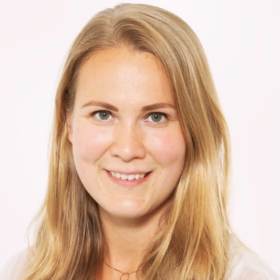
Iina L., Policy officer
I joined the European External Action Service as a policy officer in 2020 to work on cross-cutting issues in EU peace and security work. I focus in particular on the interlinkages between climate change and security, but also on health, natural resources and migration in the context of crisis management in EU external action. My work includes developing new policies and practices, drafting documents and briefings and of organizing different events.
The European External Action Service is the diplomatic service of the EU and in my work this translates to me being daily in touch with partners from around the globe.
Before my current position, I worked as a press officer in the European Parliament and as the human rights focal point at the EU Delegation in Israel. My academic background consists of a Masters in Social Sciences and a Masters in EU External Relations and Diplomacy.
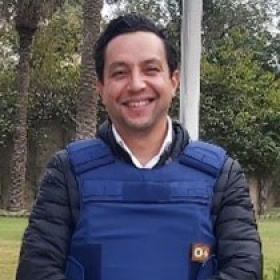
Hakim E. – Head of Administration at the EU Delegation to Iraq
What is the role of a HoA in an EU Delegation?
The job of Head of Administration in an EU Delegation is definitely the most diverse job I have seen in the EU institutions. As a Head of Administration, you are in the epicentre of the delegation, you are the one who can make things happen. In one sentence, I would say that the role of a Head of Administration is to provide all the means the colleagues need to perform their duties.
What is the most satisfying part of your job?
The most satisfying part of my job is grateful colleagues thanking you for having made things possible. As a Head of Administration, you are aware of everything inside the delegation.
Why should people apply to work for the EU and in particular for the job of Head of Administration in an EU Delegation ?
Being part of the staff representing the EU abroad is a real chance. The Head of Administration position is certainly one of those positions abroad where interactions with the local population and administration is the highest. It gives you a real understanding of the functioning of the country where you are posted.
What is it like to be posted in EU Delegations ?
In a posting like Iraq, you live and work at the delegation, which is very particular. There is no routine here, as you can start the work with fixing issues related to the IT servers and ending the day with a representation assignment at a minister’s residence.
How do you see the frequent rotation and opportunities for professional growth in EU Delegations/in the EEAS?
Each rotation is the start of a new journey and adventure. I am truly grateful for being able to evolve in such a rich environment full of motivated and skilled people.
What are the advantages of working in a diverse environment like the one of EU Delegations?
Diversity of cultures and experiences is a real source of enrichment. There is not a single day when you do not discover something new about the hosting culture, or even about the EU, through other expatriate colleagues.
What do you find difficult in turn?
Expatriation in a hardship positing like Iraq is certainly full of challenges, which allow you to discover new potential deep inside you but it comes with the price of living far away from friends and family and that is sometimes difficult.
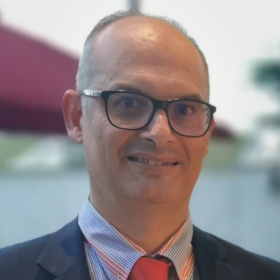
Jérôme R., Programme manager
I am currently the Peace and Security Programme Manager of the delegation of the European Union to Nigeria and to the Economic Community of West African States (ECOWAS). I manage several security programmes in Nigeria and West Africa. My job involves collaborating with several United Nations agencies and peace-building stakeholders in Nigeria and the region. I am very proud to promote EU values and interests in this part of the world.
My studies have been the starting point of my international career. I first took a Master’s degree in International Relations and Modern History at the University of St Andrews (UK), followed by a Master's degree in Political Science at the Institut d'Études Politiques de Paris (France) with a specialisation in International Relations. In addition, I received a Master of Arts in European studies from the College of Europe in Warsaw (Poland), a few years before the accession of 10 new member states to the EU in 2004.
I have been working in EU affairs since 1997. Throughout my EU career, I have had the opportunity to work in several countries (France, Austria, Germany, Belgium, the Philippines and Nigeria). My personal identity has been shaped by my experiences in so many different countries and goes beyond France where I come from. Feeling European – and even a citizen of the world – is like a second nature to me!
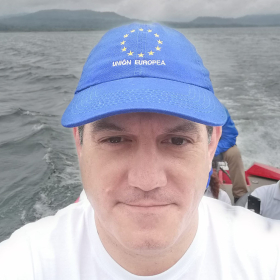
Vicente R. – Head of Administration at the EU Delegation to Honduras
What is the role of a HoA in an EU Delegation?
The job of Head of Administration is probably one of the most multifunctional ones within an EU Delegation. The Head of Administration manages and coordinates all administrative, HR, security and other key areas in the work of a delegation. In real practice, the role of the Head of Administration is to ensure that everything in the delegation works correctly, to support the technical work of the rest of the colleagues in the delegation, with special emphasis on the work of the Head of Delegation.
Why should people apply to work for the EU and in particular for the job of Head of Administration in an EU Delegation?
It is a fascinating job, which encompasses very different functions, and which is the basis for the proper functioning of an EU Delegation. Without the engine that is the administration section working properly, a delegation cannot function properly. It is a real challenge, and a very rewarding job.
How do you see the frequent rotation and opportunities for professional growth in EU Delegations/in the EEAS?
It is very interesting to have several alternatives to be able to grow within the EEAS, both professionally and personally, in different functions and/or countries. Each rotation represents personal and professional growth (including for our families) and a challenge.
What are the advantages of working in a diverse environment like the one of EU Delegations?
Allowing you to enrich yourself with the experience of people of different nationalities, residing in other countries of the world with cultural values and ways of thinking different from Europeans, but at the same time, being able to share the values that make the EU a bastion of democracy, human rights and international cooperation.
What do you find difficult in turn?
Having to solve situations that are not always common at a European level (heavy bureaucracy, different cultural behaviours), and being able to adapt to them, is a challenge, which is none other than getting out of your comfort zone.
What is it like to be posted in EU Delegations ?
It is a very enriching experience, both professionally and personally, and every day is a challenge.

Mariama, policy officer – EU Delegation to Brazil
"My name is Mariama, and I am currently working at the EU Delegation to Brazil as a policy officer. Delegations and Headquarters both offer a stimulating and cosmopolitan workplace. I have always been fascinated by the diverse profiles of my colleagues - being their professional, educational, linguistic or personal background. This diversity proves that one can pursue different career paths within the EU institutions according to one’s interests and a plethora of issues.
With a minority and/or an intersectional background, we can easily struggle with the imposter syndrome and question whether we belong to a certain place. Because you cannot be what you do not see, I truly believe in the power of representation and role models at all levels. As Claire Marin puts it : « Plus une place est désincarnée, imaginaire, moins je peux espérer l’occuper, l’habiter ». Thus, if people can witness that there are actually EU staff « like them », EU careers could have a stronger appealing effect.
No matter our background(s), we are daughters and sons of Europe, one should never hesitate to take opportunities to contribute to the European project!"
